Updated 01/09/2024 – Have you ever wondered, “When will my puppy stop biting?” It’s a question many new puppy owners ask themselves, often while nursing a nipped finger or surveying the carnage of a chewed-up shoe.
Let me share a little story about my own experience. When we brought home our energetic Poodle Mix, Bella, we were in for a bit of a surprise. Bella was this small and adorable ball of fluff. At only 6 pounds she was the smallest dog I have ever lived with. It was like having a cute, miniature teddy bear running around the kitchen.
But she was no cuddly teddy bear when it came to her biting. That was something else. Everything was a target for those tiny, sharp teeth – our hands, ankles, even the clothes we were wearing.
If this sounds all too familiar, then you’ve come to the right place. Puppy biting is a common and natural behavior, but it certainly can test your patience. Don’t worry, though; there’s light at the end of the tunnel.
In this post, we’ll explore commonly asked questions about puppy biting like; Why do they do it? and When will my puppy stop biting? Most importantly, we will share how we made it through this phase without losing our fingers. And so can you.
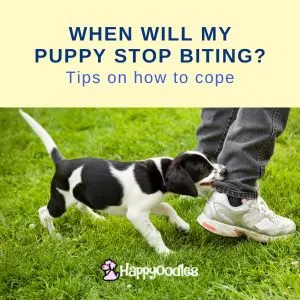
Understanding Puppy Biting
Why Puppies Bite
Puppies have several reasons for biting. Sometimes it’s to relieve the discomfort of teething, other times it’s their method of discovering their surroundings, or it could simply be their playful nature in action. Let’s look at each of these reasons to understand why puppies bite.
1. Teething phase
Just like human babies, puppies go through a teething phase that can be quite uncomfortable for them. Puppy teething usually starts around 3 to 4 months of age and can last until they’re about 6 months old. During this time, their baby teeth are falling out, and adult teeth are coming in.
Imagine how that feels – itchy and sore gums all the time!
Chewing on various things, including your hands and household items, and even nipping at human skin, provides some relief for these little pups.
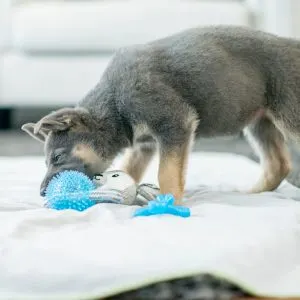
2. Exploring the world
Puppies are naturally curious creatures. For them, the world is an exciting place filled with new textures, smells, and tastes. And guess what? Their primary way of exploring is through their mouths.
When a puppy bites your fingers, a toy, or a stick in the yard, they’re learning about their environment. It’s a bit like how babies grab everything within reach. Each chomp, nibble, or bite is a way for puppies to discover what things are and how they work.
3. Play and social interaction
Biting is also a critical part of puppies’ play and social interaction, especially with their littermates. In the wild, young canines play-bite as a way to learn hunting skills and establish social boundaries.
In your home, your puppy continues this behavior, using playful nips to interact with you and other pets. It’s also their way of inviting you to play.
When puppies bite each other, they learn the limits of biting through the reactions of their playmates. This interaction teaches them the concept of bite inhibition – understanding how hard they can bite during play without causing harm.
It’s a learning process, and your reactions to their bites help them understand the boundaries of acceptable behavior.
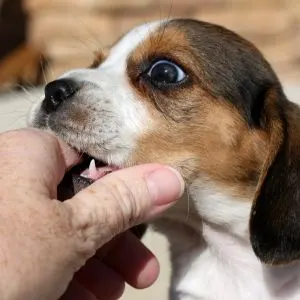
When Do Puppies Usually Stop Biting?
Understanding the timeline of teething and puppy behavioral stages is key to managing this natural, yet challenging, phase of puppyhood.
1. General timeline of teething
As previously stated, puppies typically start their second round of teething around 3 to 4 months of age. This is when they begin to lose their baby teeth, and those adult teeth start to push through.
You might notice tiny teeth around your home or see your puppy chewing more than usual. This teething phase can last until they are about 6 months old.
It’s during this time that puppies often bite the most, as they’re trying to relieve the discomfort in their gums. Providing an assortment of appropriate chew toys during this stage can be a lifesaver for your belongings and your sanity.
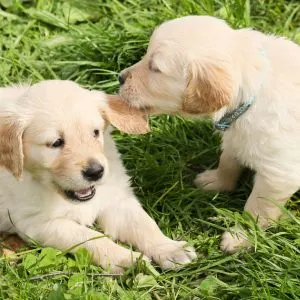
2. Behavioral development stages
Behavioral development in puppies varies. Although teething generally happens between 3 and 6 months, biting may start before teething and continue after due to play, exploration, and learning social cues.
Puppies start to grasp bite inhibition around 3 to 5 months, particularly with socialization opportunities.
The process is gradual, with most puppies outgrowing excessive mouthing by 7 to 8 months. However, each puppy is different, and some may need longer, especially without sufficient bite inhibition training.
Understanding the Influence of Breed and Temperament
Both the breed of your dog and their individual temperament can influence when a puppy will stop biting.
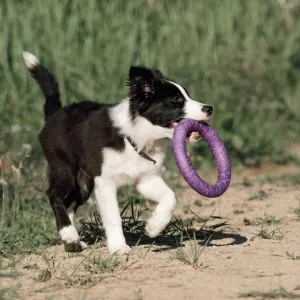
Breed Characteristics:
Certain breeds have natural tendencies that can influence their biting behavior. For example, herding dogs like Border Collies might nip more as part of their instinctive herding behavior. This can be an issue if you have young children in the house, as they tend to be viewed as sheep to a young dog.
Understanding your puppy’s breed characteristics can provide insights into their behavior and help tailor your training approach.
Individual Temperament:
Just like people, puppies have unique personalities. Some may be more energetic and playful, leading to more mouthing and nipping in play, while others might be more reserved.
Recognizing your puppy’s individual temperament is key to understanding their behavior and finding the right balance in training and socialization.
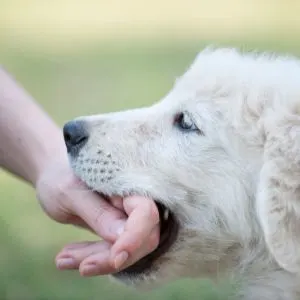
Is It Just Playful Biting or Something More?
Understanding the difference between playful biting and aggressive behavior is crucial in puppy training. Recognizing these signs can help you respond appropriately and ensure your puppy grows into a well-behaved adult dog.
Signs of Playful Biting
- Body Language: Playful biting is often accompanied by a relaxed body posture. Your puppy might have a wagging tail, a playful bow (front end down, back end up), and a generally bouncy demeanor.
- Bite Pressure: Puppies engaged in play biting usually don’t bite down hard. They’re exploring and playing, not trying to cause harm. If they do bite too hard and you yelp or react, they’ll likely back off, indicating they’re just playing.
- Noise and Activity Level: Playful puppies are often vocal, making growling or barking sounds in a light-hearted way. They’ll also be easily distracted and move from one activity to another.
Warning Signs of Aggression
- Stiff Body Language: A puppy showing aggression may have a stiff posture, raised hackles, and a fixed gaze. Their ears might be pinned back, and their tail may be rigid.
- Intense Biting: Aggressive biting is more intense and purposeful. The puppy might lock their jaw or shake their head while biting.
- Growling and Snarling: While playful growls are common, a low, continuous growl accompanied by baring teeth is a warning sign of aggression.
- Biting that Doesn’t Decrease with Age: Most puppies start to show a decrease in biting behavior around 6 to 8 months of age. If your puppy is older than this and still bites excessively or aggressively, it could be a sign of underlying issues.
When to Seek Professional Help
If your puppy consistently shows signs of aggression, not just occasional nips or playful bites, it might be time to seek help. This is especially true if the behavior is escalating, if you feel scared or unable to control your puppy.
Start by consulting your veterinarian. Health issues can sometimes manifest as behavioral problems, including increased aggression or biting. Your vet can rule out any medical causes and provide guidance on the next steps.
If health issues are ruled out, a professional dog trainer or a canine behaviorist can be helpful. Look for someone with experience in dealing with puppy biting and aggression. They can provide personalized training strategies, help you understand your puppy’s behavior, and guide you through corrective measures in a safe and effective manner.
You can find a Certified Applied Animal Behaviorists at The Animal Behavior Society directory or a Professional Dog Trainer at The Association of Professional Dog Trainers. Ask for references before choosing one.
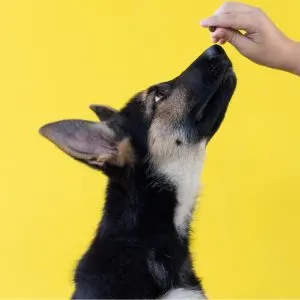
Strategies to Manage and Reduce Puppy Biting
Effective training combined with redirection is essential in addressing and minimizing puppy biting. Here are many of the techniques we used with our puppy.
Training
1. Bite Inhibition Training
- What is Bite Inhibition? Bite inhibition refers to a dog’s ability to control the force of their mouthing. A puppy that has learned bite inhibition understands how to use their mouth gently when interacting with people and other animals.
- How to Train: Start by playing with your puppy but don’t rough house with them. If they bite you, let out a yelp or a loud “Ouch!” and let your hand go limp. This mimics the reaction of a hurt playmate and teaches the puppy that hard bites are not acceptable. After yelping, pause the play for a moment. If they do not stop biting you will need to walk away from them. This pause helps them understand the correlation between their bite and the end of fun activities.
- When “Ouch” doesn’t work – The ouch technique does not always work. In some cases it might even cause them to bite more. This is what happened to us. If it happens to you, be prepared to remove yourself from the area as soon as they bite. To do this you will need some advance planning. Work on the training in a safe place where you can leave your puppy alone. It can be in a gated play area or a puppy proof room with baby gates to block the entrance. As soon as they bite, leave the area for a minute or less. If they are making any sounds, wait until they are quiet to go back in. Repeat the process until they learn not to bite.
2. Teach Basic Commands like ‘Leave It’ or ‘Gentle’
- Teaching ‘Leave It’: This command helps prevent biting before it starts. Hold a treat in your closed hand and let your puppy sniff it. Say “Leave it.” Once they stop trying to get the treat and move away, reward them with a different treat from your other hand. Practice this consistently to teach them that following the command leads to rewards.
- Using ‘Gentle’: When your puppy takes treats or toys, teach them the ‘Gentle’ command. If they grab too hard, say “Gentle,” and only release the item when they ease their grip. This teaches them to be careful with their mouth.
3. Puppy Class
Enrolling your puppy in a training class is a good idea. It offers a great chance for your pup to mingle with others, enhancing their social skills. For you, it’s a learning experience in effective communication and training techniques.
The added perk? Professional trainers are right there to help with any problems and answer your questions. Plus, you’ll likely find that other owners are facing similar challenges, providing a sense of community and reassurance that you’re not alone in this journey.
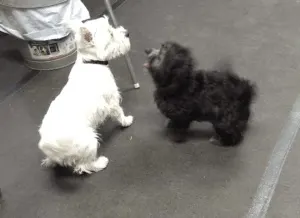
Socialization
As I mentioned earlier in this post, puppies learn bite inhibition through play with other puppies. Puppy classes or puppy socials are a good way to provide this essential interaction. These settings offer a controlled environment where your puppy can interact with others, learning the limits of play and understanding social cues under the guidance of professionals.
Not only does this help with bite inhibition, but it also aids in overall socialization, ensuring your puppy grows up to be a well-rounded and sociable dog. Just make sure where you go requires proof of age appropriate vaccines.
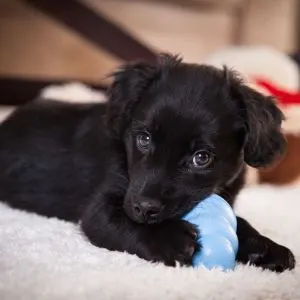
Offer an Alternative
1. Have a Variety of Toys
Puppies need a variety of chew toys to keep them entertained and to soothe their teething gums. Non-toxic rubber toys, rope toys, and soft toys are great options. Make sure to rotate the toys to avoid boredom.
It is important to note that No toy is indestructible, even if it says they are. Our 20-pound Bella has torn apart many “indestructible” toys over the years. In fact, her current Huggle Hounds soft toy is missing both ears. For this reason you should always monitor your puppy when they have toys. Take away any toy that shows wear or is torn. Broken or torn toys can cause serious harm to dogs.
2. Interactive Play
Engage in interactive play using toys. This redirects their biting tendency from your hands or feet to the toys, teaching them what is appropriate to bite. But make sure your play sessions do not include rough play as it can teach them bad habits. Also, if your puppy starts to show signs of aggression, stop playing immediately.
- Games like tug of war with a rope toy specifically made for the game are great for interactive play while keeping your hands a safe distance from their mouth.
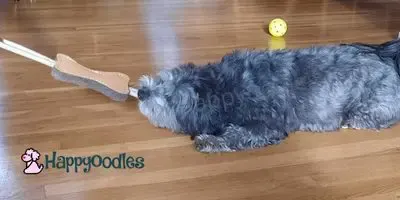
- Pole and bait toys are another great option that allows interactive play that keeps your hands a safe distance from sharp teeth. You can see Bella as a puppy in the picture below with her pole and bait toy. As a rat terrier poodle mix, Bella has a strong prey drive so this was her favorite toy at the time. However, make sure that your pup is not jumping to go after the bait. According to the American Kennel Club puppies should not be made to jump before 12 to 15 months of age.
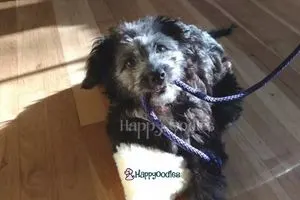
We bought the Vee Chase and Pull Large dog toy at our puppy training class, but you can find it along with other types of pole toys on Amazon.com and maybe at local retailers.
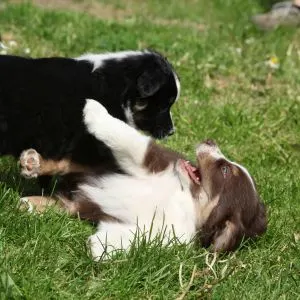
3. Adequate Exercise
Puppies have a lot of energy, and without a proper outlet for this energy, they may resort to biting as a form of play and exploration. Regular exercise helps burn off your puppy’s excess energy. A tired puppy is less likely to engage in inappropriate behaviors.
Exercise isn’t just about physical activity; it also provides mental stimulation. Activities like walking, exploring new environments, or playing fetch can keep your puppy’s mind engaged and satisfied, reducing the likelihood of biting out of boredom or frustration.
However, it’s important to tailor the amount and type of exercise to your puppy’s age, breed, and energy level. Puppies have growing bodies, so their exercise shouldn’t be too intense or prolonged. Short, frequent bursts of activity are generally more suitable for young puppies.
Talk to your vet about where your puppy can safely go if they don’t have all their vaccines yet.
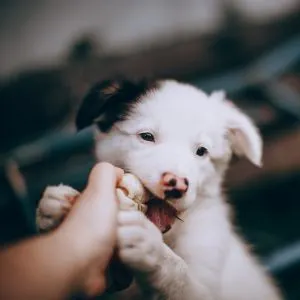
Recognize Signs of Over Stimulation.
It took us a while before we realized that our puppy, Bella was being overstimulated. She just seem to have energy that went on forever. But when puppies become overly excited or stressed it can lead to more biting. Signs include frantic activity, excessive barking, and inability to settle. To combat over stimulation:
- Provide Quiet Time: Ensure your puppy has a quiet space to retreat to when they feel overwhelmed. Crate training can be beneficial here, offering them a safe and calm space.
- Balance Play and Rest: Puppies need a lot of sleep. Ensure they get enough rest between play sessions to prevent over tiredness, which can contribute to nippy behavior.
Set Boundaries from Day One
Determine what is and isn’t acceptable behavior in your home from the start. If biting is not allowed, be consistent in reinforcing this rule.
- Consistency is Key: Ensure all family members and visitors are on the same page regarding these rules. Mixed messages can confuse your puppy and make training more difficult.
- Use Positive Reinforcement: Encourage good behavior with praise and treats. If your puppy nips, redirect them to a toy or give a firm, gentle command like “no bite.”
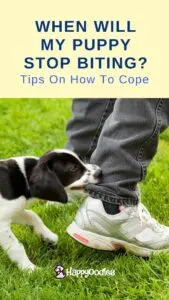
Common Mistakes to Avoid with Puppy Biting
Let’s talk about some common pitfalls to avoid when dealing with puppy biting.
- Inadvertently Encouraging Biting: Avoid games that encourage biting like play-fighting. These games can send mixed signals and make the biting habit harder to break.
- Neglecting the Need for Play and Exercise: Puppies have a lot of energy. Without proper outlets for their energy, they may resort to biting as a form of play and to get your attention.
- Overwhelming the Puppy: Be mindful not to overwhelm your puppy with too much, too soon. Gradually introduce new experiences and people, allowing them to adjust at their own pace.
- Skipping Routine: Puppies thrive on routine. Regular feeding times, potty breaks, playtimes, nap-times and training sessions help them understand what to expect and reduce anxiety-related behaviors, including biting.
Navigating your puppy’s biting phase requires patience and understanding. It’s essential to remember that this behavior is a normal part of their development, and with consistent training and positive reinforcement, it will improve over time.
Keep up with effective strategies like bite inhibition training and setting clear boundaries, and remember, the effort you put in now is shaping your puppy into a well-mannered adult dog.
Remember to hang in there, and enjoy this special time with your new pup.
